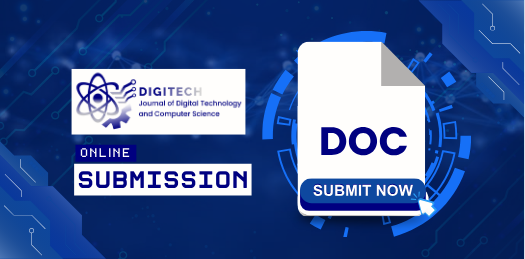| LOGIN |
Artificial Intelligence Policy
Artificial Intelligence Policy
Guidelines for Responsible AI Usage in the DIGITECH: Journal of Digital Technology and Computer Science
For Authors
Ethical and Responsible Use
Authors must clearly disclose any use of Artificial Intelligence (AI) tools throughout the research and manuscript preparation process, including data collection, data cleaning, analysis, visualization, or writing assistance. Proper acknowledgment must be provided for any AI-generated content included in the manuscript. Authors remain fully responsible for the accuracy, originality, and integrity of the final submission.
Use of AI that involves personal or sensitive data must comply with applicable data protection and privacy regulations; informed consent must be obtained where required. Authors must identify and mitigate potential biases arising from AI models, datasets, or procedures. All AI-assisted content must respect intellectual property and copyright law.
AI in Research Methodology and Data Analysis
If AI tools, models, libraries, or pre-trained datasets are used, authors should describe the methods, tools, software versions, parameter settings, and the source of datasets (including any licensing constraints). Results produced or assisted by AI must be validated using standard research protocols, reproducibility checks, or appropriate cross-validation.
DIGITECH encourages use of interpretable and explainable AI methods where possible and asks authors to discuss limitations, known biases, and the sensitivity of results to AI-specific choices.
Academic Integrity and Originality
Any substantive assistance from AI (text, figures, analyses) must be explicitly acknowledged in the manuscript and, where relevant, cited according to accepted academic practices. Manuscripts must primarily reflect the authors’ own intellectual contribution, critical thinking, and scholarly interpretation. Submissions that rely predominantly on AI-generated text or data without significant author involvement may be rejected.
Use of AI for language polishing is permitted, but authors must ensure that edited text remains accurate and truthful to the original scientific content.
Transparency in Peer Review and Collaboration
Authors should disclose AI usage during submission (e.g., in a dedicated "AI statement" or in the methods/acknowledgment sections) and agree authorship and data-management roles within collaborative projects up front. Clear transparency supports reproducibility and trust in peer review.
For Reviewers
Reviewers must treat manuscripts as strictly confidential. Reviewers are prohibited from uploading or submitting full manuscripts or identifiable manuscript content to external generative AI services (e.g., ChatGPT, Bard, other LLMs) because this may breach confidentiality, intellectual property rights, or data protection rules. Reviewers may use local, non-transmitting tools for language checks (e.g., offline spell-checkers) provided no confidential content leaves the review environment.
Reviewers should evaluate AI-assisted outputs critically, request clarification where necessary, and report any suspected research integrity concerns to the editorial office.
For Editors
Editors must preserve manuscript confidentiality and must not upload or paste manuscripts into generative AI tools that transmit content externally. Editorial decisions must be made by qualified humans using peer review reports and editorial judgment. Where editors use AI-assisted tools for administrative tasks (e.g., formatting checks) they should ensure data remains private and tools comply with privacy and security requirements.
Editors will require authors to include an explicit statement about the role of AI (if any) in the submission. The editorial office may request additional documentation about AI methods or data provenance when necessary for review.
Implementation and Compliance
Non-disclosure or misuse of AI that results in breaches of privacy, plagiarism, fabrication, or other ethical violations will be handled according to the journal's Publication Ethics policies. Suspected breaches may lead to manuscript rejection, correction, retraction, or further institutional investigation.
DIGITECH will periodically review and update this policy to reflect advances in AI, standards for transparency, and community best practices.
Template AI Disclosure Statement (authors may adapt)
"The authors declare that AI tools were [used / not used] in the preparation of this manuscript. Specifically, the following tools were used: [tool names], for [description of use]. The authors take full responsibility for the accuracy and integrity of the content presented."
For questions about this policy, or to report concerns, please contact the editorial office at digitech@lontaradigitech.com.








 Email:
Email: 
